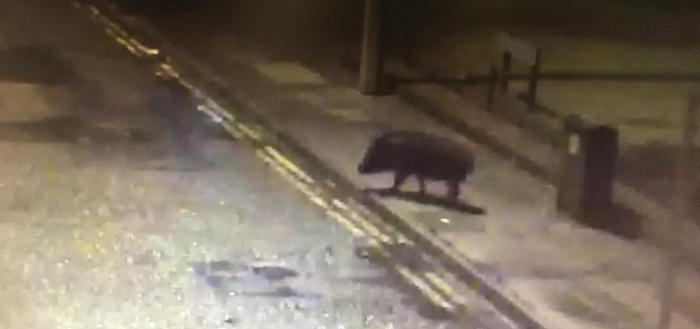The burgeoning Forest of Dean wild boar population is becoming ever bolder, if images posted by Gloucester police are anything to go by.
In a Twitter post, Gloucester police asked: “Have you lost a #pig? One’s been roaming Westgate Street in Gloucester tonight. If it’s yours, please ring 101 and let us know!”
The post, which has received hundreds of ‘retweets’ and ‘likes’ on Twitter and has been covered across the national media, prompted locals to point out this was not a domestic pig but a wild boar. According to the Telegraph, local resident Ian Hatton said on Facebook: “That’s not a pig; that’s a boar. It may be wild but it’s worrying if they are coming into Gloucester.”
Survey figures last year estimated there were 1,562 feral wild boar roaming the forest of Dean, with populations spreading to new areas. The surge in numbers occurred despite a cull of more than 400 wild boar in the forest and experts are warning the population could hit 10,000 within a few years unless proper controls are put in place.
Wild boar have increasingly been causing havoc among the general public, with previous reports of animals wandering around town centres, wrecking bins and gardens and chasing dog walkers. By last year, there had been 49 wild boar-related road traffic accidents in the area recorded since April.
The main concern of the National Pig Association, however, is that wild boar, which have been implicated in the spread of African Swine Fever in Eastern Europe, pose a threat to the health status of commercial pig herds.
NPA chief executive Zoe Davies said: “Wild boar have played a major part in spreading ASF in Eastern Europe and this highlights once again the need to ensure we have robust control measures in place to prevent our wild boar populations spreading out of control.”
Speaking to the Telegraph, Simon Gaskell, a boar farmer and owner of the Real Boar Company, said that wild boar were growing in number and size due to their hybrid genetics.
“The boars from the Forest of Dean have cross-bred with outdoor reared pigs,” he said. “It means they put on weight quicker and have larger litters. Wild boars take 18 months to grow fully while a farmed pig takes just four-and-a-half.”
“The thing is that you can farm pigs in an enclosure with an electric fence just six inches off the ground. But if an in-season sow sees a boar, it’s not going to stop it from escaping and for them to mate.
“On the other foot, boars can jump up to six feet, so the fence is of little use. I know, because my own have done it. So it isn’t very difficult, either way, for cross breeding to occur.
“There were also rumours ten years ago of one farmer releasing his stock [of wild boar] in the forest because he couldn’t make any money out of it. There’s every chance they were hybrids, because they often are.”




